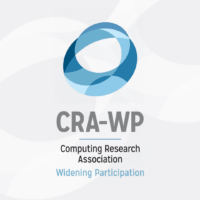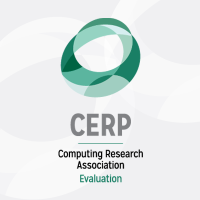Widening Participation Spotlight: Amanda Holloman, University of Florida
By Matt Hazenbush, Director of Communications, and Elora Daniels, Communications Associate

As part of CRA’s mission to raise awareness and engagement in efforts to widen participation in computing, Computing Research News presents a Q&A series titled “Widening Participation Spotlight: Conversations with Underrepresented Computing Researchers.” This series highlights the work of community members who are actively involved in widening participation for underrepresented groups in computing or who have participated in CRA-WP activities. Through direct interviews with mentors and students, this series aims to showcase important initiatives and raise awareness of the various opportunities available for those interested in mentoring and community-building.
In our inaugural Q&A, we spoke with Dr. Amanda Holloman, a Visiting Assistant Professor at the University of Florida, about her experiences as both a mentor to young computing researchers and a former participant in the CRA-WP mentoring program at Grace Hopper. Dr. Holloman earned her PhD from the University of Alabama, with a focus on human-computer interaction (HCI), brain-computer interfaces (BCI), and olfactory-based interactions (OBI).
What inspired you to pursue a career in computing research?
Growing up on the west side of Atlanta, not many people finish high school, let alone go on to earn a bachelor’s degree. During my sophomore year of high school, my parents divorced, and a house fire soon followed. I began looking for a school activity to keep me busy and out of the streets. I wasn’t sure what to pursue, but God guided me to explore computers. I asked my computer science teacher if he had any school activities because my mom always said, “an idle mind is the devil’s workshop.”
My high school had two computing opportunities: Girls Who Code and I3 at Georgia Tech. I signed up for I3 at Georgia Tech, which is where I met Dr. Christina Gardner-McCune. Being around her and seeing a Black woman with a PhD, calling her “Doctor,” was an incredible experience. She encouraged me to pursue a degree in computer science. I ended up earning my undergraduate degree from Albany State University, and now Dr. Gardner-McCune is my colleague!
Ultimately, I began to explore computing research because I had a mentor who looked like me and believed in me.
What were some of the challenges you faced as a Black woman in Computing?
In grad school, being at a predominantly White institution was very isolating. When I first started, I was the only young Black woman, which made me feel underprepared. Everyone else around me was male and had access to resources I didn’t even know I needed.
How did you first hear about the CRA widening participation mentoring program at Grace Hopper and what motivated you to get involved?
My mentor, Dr. Monica Anderson, said, “You need to be a part of this. This is something that I feel will greatly benefit you. You get to meet other people of color and women in computing.” I wanted to experience something different from what I was used to seeing in Alabama. Meeting the women there, talking to them, and hearing about their experiences — learning about the trials and tribulations they overcame — made me feel less alone in my journey.
Can you describe your experience with the CRA WP mentoring program? How did it impact your educational and professional journey?
It really motivated me to do more. It gave me something to look forward to and strive for. I realized that if I didn’t make it, I wouldn’t be able to help someone else. The program inspired me to keep going so I could hopefully support and inspire other young women. Career-wise, it opened my eyes to the different avenues I could explore. It got me thinking, “Maybe I want to go into industry and do research through different companies, or maybe I want to be a data analyst. Or perhaps I understand academia and want to teach, be an instructor, or do research.”
Having these opportunities laid out in front of me helped me see what I was most comfortable with. Talking to different women and hearing their experiences helped me narrow down my interest in staying in academia. I like autonomy and having the opportunity to explore my own curiosities.
Can you share any specific moments or interactions during the mentoring program that were particularly impactful or memorable?
I’ll never forget it. Grace Hopper is HUGE. It was so amazing. I remember walking past a long line of people waiting to talk at the Apple booth when a woman asked if I had applied to work at Apple. I hadn’t considered it because I’d heard they weren’t really looking for PhDs at the time. She asked about my research, and I told her about my focus on olfactory interactions. She was so intrigued that she signed me up on the spot and brought me to the front of the line to talk to another researcher. She was so excited by my work. It was really inspiring to have someone I had just met have that much faith in me. That moment taught me not to count myself out.
How did having a mentor through CRA-WP or otherwise influence your approach to research and your career trajectory?
It really changed my whole career trajectory and my life. God has blessed me with intelligent women to guide me from kindergarten all the way up. When I got to graduate school, having my mentor from high school, Dr. Christina Gardner McCune, as well as Dr. Monica Anderson and Dr. Susan Vrbsky at UA, really motivated me to want to be a mentor myself.
During the pandemic, I founded a nonprofit called The BankHead Foundation, which aims to offer new perspectives to encourage independent thinking and self-sufficiency and allows me to continue mentoring young women. This year, I was also sponsored by a Christian community school in Gainesville, Florida, to support a summer camp for young women. I’m sponsoring seven young ladies, and we go on field trips, I teach them computer science, and we reflect on how to be a better person, woman, friend, daughter, and sister, and how to achieve their dreams. I tell them, “Whatever I do for you, you have to promise me that you’ll pay me back by helping another young lady. I’m only able to sit here and do this for you because women before me did it for me. So, to pay me back, you have to help someone else.”
I teach them that we are standing on the shoulders of the women who came before us. You’re living your life for the people before you and after you, and you can only do your best in the present moment.
I was very blessed to have many mentors, especially Christina Gardner, Dr. Monica Anderson, my high school vice principal Ms. Taylor, and Ms. Danielle Evans. These mentors introduced me to different environments, opportunities, and ways of life, showing me how to carry myself and how to answer questions.
What advice would you give to young women of color who are considering a career in computing research?
There will be times when it’s not easy. Nothing worth having in life ever comes easy, and if it does, you won’t have it for long. CS research is very rewarding, but it’s also very demanding and consuming. Make sure it’s something you genuinely want to do. Find a purpose—find a cause that truly resonates with you.
For me, it was olfactory research because I wanted to help alleviate negative physical manifestations like anxiety attacks and panic attacks, specifically psychogenic seizures. My mom was diagnosed with epilepsy, but I could tell it was not regular epilepsy. After a lot of research, it became apparent that they were psychogenic seizures. Having something close to me kept me from giving up. Find something that means something to you, a cause you’re willing to lose sleep over and sacrifice for. Don’t give up because your CS research is going to be a small dot in the big circle of life and research. Your dot is important because, without it, the circle doesn’t close. Make your dot the brightest it can be.
It’s going to get hard, but don’t give up. Stay motivated and keep your mind focused. It’s not just for you; remember why you’re doing it and keep going. If my mentors taught me anything, it was “don’t give up.” You can stop, take a break, and cry if you need to, but don’t give up.
How do you balance your research teaching and mentor responsibilities?
I know what I’m doing it for, and I just try to stay focused. I have a notebook where I write down everything I have to do and color-code it: pink for research, yellow for personal matters, and green for my nonprofit. I write everything down, and when one sheet gets full, I move to a new one. But I have to cross everything out before starting a new sheet. Having my responsibilities laid out helps me get all my ideas and thoughts out of my head and see them concretely. It doesn’t feel as overwhelming because I can prioritize tasks based on their deadlines.
Staying organized like that really helps. Also, having a good support system is crucial because there are days when I don’t feel my best. Calling my support system and having them speak life into me helps a lot. A good support system, a clear focus on what you need to do, and prioritizing your responsibilities are key.
How can organizations and institutions better support underrepresented groups and computing research?
Having a good financial support system in place to assist students from backgrounds like mine, where parents may not be able to fully support them with tuition and basic necessities like groceries, would be immensely helpful. When I was about to graduate, I didn’t even have enough funds to pay for my cap and gown. My department chair ended up covering the cost for me. Without these mentors providing financial, mental, emotional, and spiritual support, I wouldn’t have been as successful as I am today.









